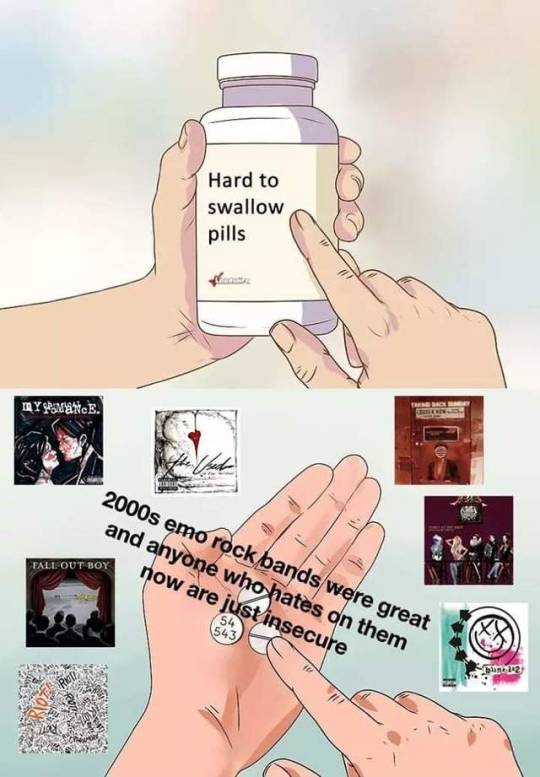
For my final post, the truth-o-meter, I decided to expand on fact check four. In fact check four, I examined the claim that listening to the band, My Chemical Romance, is good for people’s health.
As I mentioned in my previous post, I decided that since I am a big fan of My Chemical Romance, I would do a quick search to find out if there were any studies that incorporated the group. To begin, I typed “My Chemical Romance studies” into DuckDuckGo. The first result was an MTV.com article, which argued that listening to My Chemical Romance is good for your health. The article, which was posted on the site in June of 2015 by Deepa Lakshmin, a writer, editor, and social media strategist who admitted that she never grew out of her emo phase, argued that listening to heavy metal and screamo music helps people to process anger, and that “this type of music regulated sadness and enhanced positive emotions.” Furthermore, it explained that “when experiencing anger, extreme music fans liked to listen to music that could match their anger.” In turn, the music allowed listeners to explore the emotions they were feeling, but also left them “feeling more active and inspired.”

As someone who went through a very cringeworthy emo (read: angry) phase in middle school, I was immediately intrigued by this claim. I remember feeling so happy and understood when I listened to the band during that time in my life, and I definitely wanted to find out more about the science behind that feeling. Still, I was skeptical of whether or not there was any reputable scientific research behind this claim, but after finding a link to a study in a scientific research journal in the article, I decided I would investigate whether it was credible.

To begin, I went upstream and found that in 2015 the Frontiers in Human Neuroscience journal posted the study, “Extreme Metal Music and Anger Processing,” which spurred the MTV.com post about how listening to My Chemical Romance is good DuckDuckGo and typed “music therapy” into the search bar. From there, I clicked on the Wikipedia page for the topic in hopes of gathering a bit of background information about the field of music therapy. From the page, I was able to find out that music therapy is” an evidence-based clinical use of musical interventions to improve clients’ quality of life. Musical therapists use music…to help clients improve their health in cognitive, motor, emotional, communicative, social, sensory, and educational domains by using both active and receptive music experiences.” I also found out that receptive music therapy actually involves listening to recorded or live music that is selected by a therapist. This has been found to “improve mood, decrease stress, decrease pain, enhance relaxation, and decrease anxiety.”

Once I found out tis information, it began to seem less of a far-fetched that My Chemical Romance could help people process their anger. Additionally, this showed that there has been a lot of research done about how music can help people and served as a great starting point for my research into the credibility of this article’s claims.
Then, in an attempt to gather information about the journal’s reputation, I went to DuckDuckGo and typed in “frontiers in human neuroscience reputation -site:frontiersin.” From there, I clicked on the Frontiers In Wikipedia page, which described the journal as an “academic publisher of a peer-reviewed open access scientific journal, which is currently active in science, technology, and medicine.” The article continued on to say that it was founded in 2007 by a group of neuroscientists, and is based in Switzerland, with other offices in London, Madrid, Seattle, and Brussels. The Wikipedia page also stated that the journal participated in predatory publishing acts, which is detrimental to its credibility. However, the journal is still an active member of the Committee on Publication Ethics and the Open Access Scholarly Publishers Association. I decided to look more into the predatory publishing acts, since that is an important factor of the trustworthiness of the journal. I typed “frontiers in human neuroscience predatory -sites:frontiersin” into the search bar on DuckDuckGo, and I found a WordPress site called the Clinical Librarian. The site contained an article with all of the predatory publishers on the infamous Beall’s List. It warned that those who consult, cite, or submit work to these publications should do research first and come to their own decision of whether it is a reliable source.

At this point I was becoming suspicious of this publication, so I decided to investigate the credibility of the authors of the journal article, Leah Sharman and Genevieve Dingle. When I typed their names into the search bar, the first result that I found was a page of their journal articles, conference papers, research reports, and theses from the School of Psychology at the University of Queensland in Australia. These findings demonstrated that both authors have an academic background in both Psychology and research, which contributes to their overall credibility. When I began to look further into what prior research the authors had conducted, I found that Sharman’s thesis was titled “Frustration Sublimation: An Investigation Into Anger Processing Among Extreme Music Listeners.” The two also conducted a research study focusing on reward sensitivity and music involvement, which I found to be pertinent as well. Furthermore, when I researched both names on Google Scholar, their article about extreme metal music and anger processing was the first search result that appeared.

I then began to investigate what Frontiers In’s most recent impact factor score was. To find this information, I went to the Rowan University Database Library and located the InCites Journal Citation Reports. From there, I typed “Frontiers In Human Neuroscience” into the search bar, and was able to find out that the journal was given an impact factor of 2.870 out to 10+ in 2018. I also discovered that it had a median article citation of 2 and a median review citation of 4.


Ultimately, I was unable to completely deduce whether or not Frontiers In is a reputable scientific journal. Sharman and Dingle have both published numerous research studies through a respectable university and have a good reputation in the research world. Still, the journal itself has been accused of being a predatory publisher and has a very low impact score. Additionally, the study did not exactly match the MTV.com article in the sense that it was not specifically conducted to determine why listening My Chemical Romance is good for people’s health, although it did focus on metal music, which the band could be grouped in with.
Based off of all these issues, I came to the conclusion that the study is probably true. Despite the fact that the journal has been accused of being a predatory publication in the past, it remains a member of both COPE and OASPA, whose goals are to define the best practice in the ethics of scholarly publishing, which leads me to believe that the accusation may have been premature. Additionally, Sharman and Dingle are respected members of the research community, which bolsters their article’s credibility. This helped me to decide that while the reputation of the journal itself has been called into question in the past, the authors and their previous work remain credible, and bolster my belief in integrity of the article.

